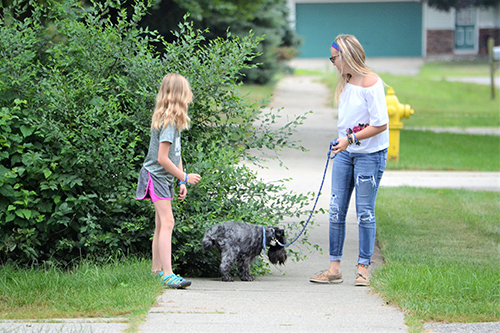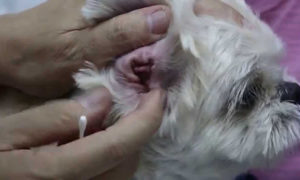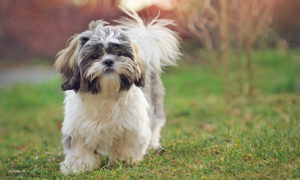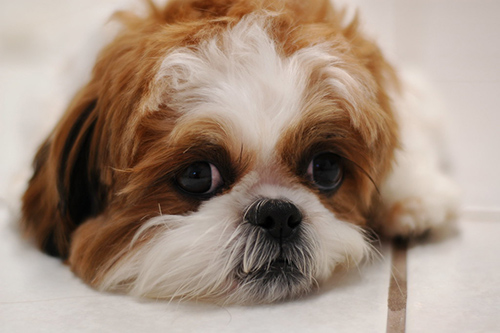
Keeping your Shih Tzu happy and healthy can ensure that she lives to be 16 years or more. Also, with suitable breeding practices as well as adequate care, your Shih Tzu may avoid having to experience the following Shih Tzu health problems.

I have a 15-year-old Shih Tzu (Mello) that is still very active, playful, and outgoing; though his hearing is not what it was in his younger days, he never suffered from any conditions that commonly affect the breed. However, it is still always a good idea to know what common Shih Tzu health problems can affect your dog.
Shih Tzu Health Problems and Issues
Cataracts: Cataracts usually occur from birth to three years old and typically lead to blindness. However, after age three, the condition is milder.
Corneal ulcers: All Shih Tzu eyes are not the same; however, those whose eyes protrude are at a higher risk for these ulcers. Many corneal ulcers are a result of wind blowing foreign substances in their eyes.
Entropion: This condition is when one or both Shih Tzu eyelids turn inward, which causes the eyelashes to irritate the eyeballs. Thankfully, this condition can be amended easily with surgery.
Epiphora (wet eye): This condition causes excessive tearing or an overflowing of tears, which occurs when your dog’s tear ducts do not drain properly. This issue is on the list of Shih Tzu health problems because of their shorter face structure. Other eye issues, as well as eye infections, can also cause epiphora.
Otitis externa: Otitis externa is the Inflammation of the ear canal that can become chronic. It causes irritation, discomfort, and pain that will need treating with medication. Ear infections are common among Shih Tzu health problems because of their narrow ear canals, lush hair growth, and long ears.
Epilepsy: Most epileptic seizures usually are mild, quick, and only affect a part of your dog’s body. However, there are those attacks that are dramatic as well as disruptive and can result in your dog falling, twitching, and loss of consciousness.
Epilepsy results from an electrical backfiring in the brain when the neurons send out too many “move” indicators, which leads to the muscles seizing. Epilepsy is mostly considered to be a genetic issue but can be a result of tumors or toxins.
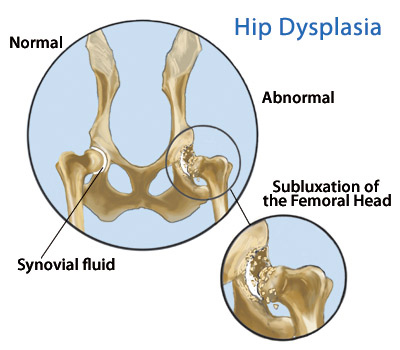
Hip dysplasia: Experts consider hip dysplasia to be a congenital problem that mostly affects larger dog breeds; however, it can cause issues for small dog breeds as well, such as the Shih Tzu. Dogs that suffer from this ailment experience lameness and weakness to the back legs when the ball of the hip joint does not correctly fit into the socket, which sooner or later will lead to painful arthritis.
A variety of factors that can bring about hip dysplasia other than genetics include excess calcium, environmental factors, obesity, high calorie and protein diet, and too little or too much exercise.
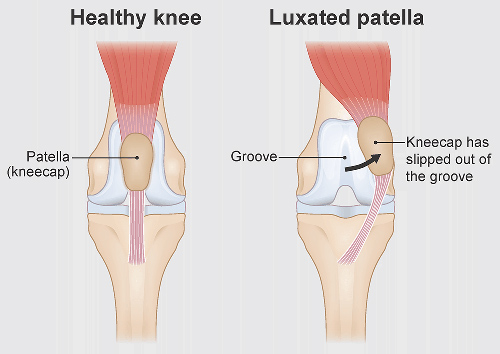
Patellar luxation: This condition involves a slipping or floating kneecap, which is a common ailment in many of the smaller dog breeds weighing less than twenty-two pounds, which thrusts it on the list of potential Shih Tzu health problems. Another possible cause is when these small dogs jump or accidentally fall from high areas.
Dogs with this condition may appear to be skipping as they walk down the street; they lift one leg as the kneecap slips in and out of the patellar groove, which causes the leg to lock. However, surgery is preferable in more severe cases.
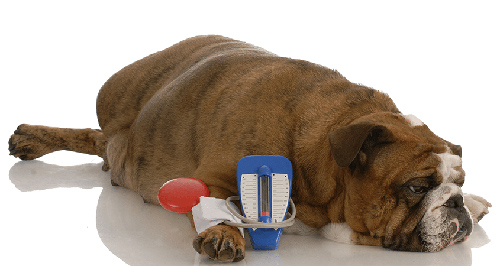
Hypoglycemia: Low blood sugar is a common condition that affects all toy dog breeds, and usually presents itself when puppies forget to eat. Blood sugar levels will most likely drop early in life, between the ages of birth to nine weeks, and can appear later on from twelve years until death. This condition is also a result of stress due to your dog not eating, and it can present itself at any age.
Signs of hypoglycemia are mild at first. However, as the condition worsens, your dog will become lethargic, along with experiencing heavy or labored breathing. Thankfully, low blood sugar is not difficult to treat, but you must act quickly, especially when it comes to puppies. You can buy a tube of high protein paste called Forti-Cal Gel, Nutri-cal, or Nutri-stat. However, the most natural home remedy is Clear Caro Corn Syrup or honey.
Though, the most effective way to treat hypoglycemia is through prevention. Therefore, please pay attention to your puppy and make sure that they are eating regularly and adequately prepared meals. Even if you leave food out all day, there is no guarantee that your puppy will eat on time or at all.
More Shih Tzu health issues
Hypothyroidism: This condition is a result of the dog’s inability to produce the thyroid hormone; however, experts do not consider it a threat to the dog’s quality of life because it is treatable with drug therapy. Nevertheless, if not treated promptly, it can and will lead to heart issues. Symptoms of hypothyroidism include weight gain, constant hunger, reduced energy, obesity, and change of coat texture. Your veterinarian can find out if your dog’s thyroid is working correctly with a blood test.

Intervertebral disc disease: Because the Shih Tzu’s body is longer than it is tall, they are susceptible to intervertebral disc disease, which causes neck and back problems.
The purpose of the intervertebral disks is to provide a cushion for the spine. However, if they rupture or bulge, it can cause nerve problems, severe pain, and loss of coordination. This ailment can lead to permanent paralysis and weakness.
Dental Disease: Teeth care is essential for all dog breeds. However, those with smaller jaws like the Shih Tzu will require special attention. Adult Shih Tzus could suffer premature death from gum-related diseases without proper daily dental care.
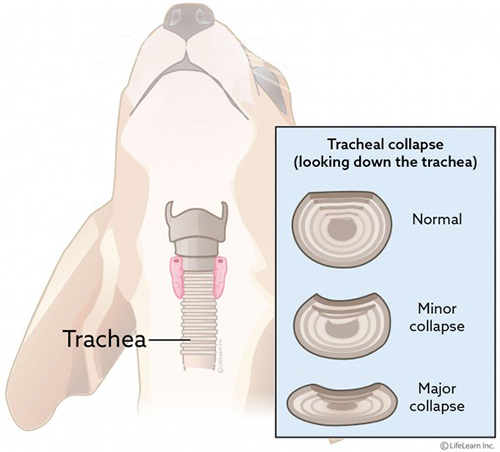
Tracheal Collapse: A tracheal collapse or “reverse sneezing” obstructs the dog’s airway. For the most part, the coughing or honking associated with this condition is brought on by eagerness over going to see a new dog or eating a particularly tasty treat. Also, irritants in the atmosphere, such as car exhaust, dust, or smoke, can incite symptoms.
Exercising your dog in humid or hot weather can exacerbate symptoms, especially if your Shih Tzu is overweight. In mild cases, a coughing session can last for a few seconds. You can help by gently rubbing your dog’s nose or squeeze around the rib cage, which helps to relax the trachea and improve airflow.
Portosystemic shunt: This condition is a life-threatening congenital disability, which causes the abnormal circulation of blood, and is a malformation of the portal vein. This particular vein is responsible for transporting blood to the liver. Experts also call this ailment “liver shunt.” Symptoms of PSS include lack of appetite, weak muscles, small size, learning issues, vomiting, diarrhea, poor coordination, and behavioral problems. Unfortunately, treatment of PSS is not always successful, and the afflicted dog will suffer from dementia caused by brain damage, which will lead to a coma and eventually death. Before you purchase a puppy, ask the breeder if the puppies got tested for PSS.
Stenotic nares: This condition is among the many Shih Tzu health problems, and it is an inherited defect that mostly affects brachycephalic breeds with their short noses and flat faces. Dogs that are suffering from this ailment have a narrowed or restricted nostril, which limits the amount of air the dog can get causing difficulty breathing. If left untreated, your Shih Tzu will eventually develop an enlarged heart.
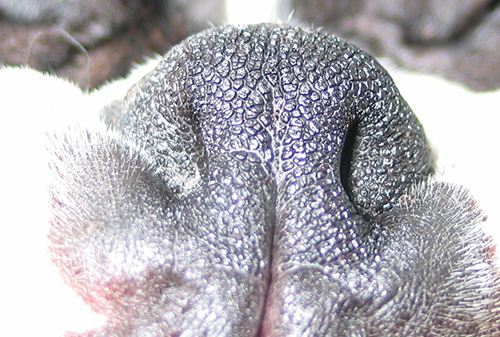
Stenotic nares can cause snorting, snoring, grunting, sniffling with nasal discharge, and sneezing, which are all common occurrences in the Shih Tzu. Along with the loud breathing noises, you will notice that dogs with this condition cannot play for long periods without having to rest. Also, their gums are pale, and the newborn puppy usually does not make it past the weaning phase.
Eventually, most puppies will get over these problems as they mature; however, if they do not, surgery can potentially remedy the situation. The surgery entails cutting the cartilage between the two nostrils.
Von Willebrand disease: This disease is a mild to a moderate disorder of the blood that is comparable to hemophilia in humans where the blood loses its ability to clot properly due to a reduction of glycoprotein, which is a clotting agent. Therefore, if your Shih Tzu gets injured, they are more likely to bleed profusely, which could lead to death.
Signs of Von Willebrand disease include intestinal bleeding, nose bleed, bleeding from the gums, urinary system problems, diarrhea, and small hemorrhages that develop on the gums. There is a simple DNA test that your veterinarian can administer to rule out this condition instead of you having to wait for symptoms to appear.
Preventing injuries: Always keep your eyes on adventurous puppies; never allow them to jump from heights such as the couch, bed, chair, or even out of your arms to the ground. Puppies can break their bones easily because their bones are not strong enough to withstand a jump from such heights. Also, younger puppies have the potential to hit their heads on the floor if jumping from that high, which could cause teeth and jaw injuries.
Obesity: One of the most common and preventable Shih Tzu health problems is being overweight. Many new dog owners never consider the possibility that allowing their canine companion to become obese is not good. Dogs, in general, are fantastic athletes; however, if you do not provide them with the opportunity to exercise, you will end up with an overweight and unhealthy companion.
There is no debating that most dogs are overweight because they love eating; however, although your Shih Tzu is not a big eater, they still need exercise. Lack of proper exercise can lead to laziness, which will lead to obesity and then health problems. Taking good care of your dog’s health, and purchasing them from a reputable breeder, will ensure that they will never have to experience any of the above Shih Tzu health problems.

